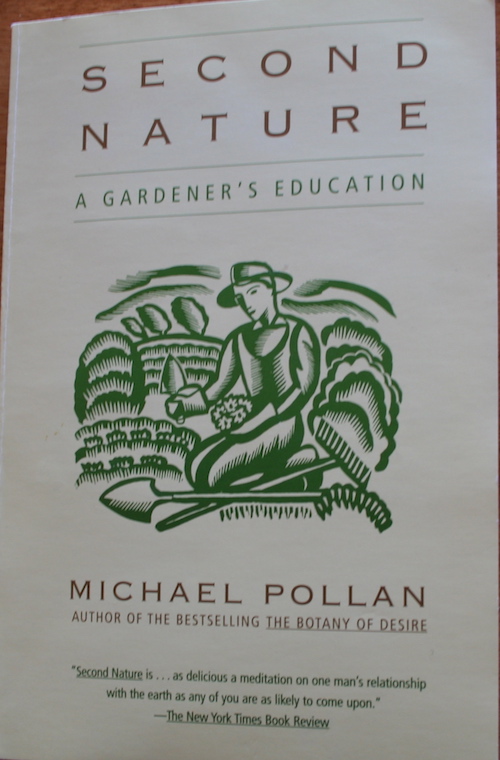A Gardener’s Reading: First of 30
By Michael Pollan (Grove Press, 1991)
Before The Botany of Desire, before The Omnivore’s Dilemma and Food Rules, Michael Pollan wrote this book of essays on his experiences as a new gardener. This is the book that got me hooked on garden memoirs – and to some degree, gardening itself – back in the 1990s. Even as the garden memoir genre has grown, Second Nature remains one of the best.
 Erudite and unfailingly honest, Pollan walks through the seasons of the year and through his growth as a gardener, from the power struggles he witnessed between his obsessive gardener grandfather and his father who saw no point in mowing grass, which got Pollan started as a gardener, to his battles with woodchucks and weeds as he planted trees and carved gardens from a neglected farmstead in New England. This is a book worth buying, because you’ll want to underline the funny bits and the memorable lines, of which there are many.
Erudite and unfailingly honest, Pollan walks through the seasons of the year and through his growth as a gardener, from the power struggles he witnessed between his obsessive gardener grandfather and his father who saw no point in mowing grass, which got Pollan started as a gardener, to his battles with woodchucks and weeds as he planted trees and carved gardens from a neglected farmstead in New England. This is a book worth buying, because you’ll want to underline the funny bits and the memorable lines, of which there are many.
A few samples:
On gardens and children: One of things childhood is is a process of learning about the various paths that lead out of nature and into culture, and the garden contains many of these.
On fighting critters: It’s astonishing, actually, how much anger an animal’s assault on your garden can incite. It was not as if I were liable to go hungry as a result of his depredations, after all. No, this was no longer merely a question of vegetables or self-interest. This was about winning.
On being a “green thumb’: It’s easy to get discouraged, unless, like the green thumb, you are happier to garden in time than in space; unless, that is, your heart is in the verb. For the garden is never done – the weeds you pull today will return tomorrow, a new generation of aphids will step forward to avenge the ones you’ve slain, and everything you plant – everything – sooner or later, will die. Among the many things the green thumb knows is the consolation of the compost pile, where nature, ever obliging, redeems this season’s deaths and disasters in the fresh promise of next spring.
The essay on weeds, in which Pollan explains that the plants we classify as weeds are direct results of gardening (they are generally not strong competitors in wild settings), should be required reading for all gardeners. It would ease anxiety about pulling weeds and improve self-esteem about having them; it might also reduce the desire for perfect beds.
If you want to curl up this winter with a book about gardening, this is the first one I recommend.
Tomorrow’s book: A Pattern Language
I’ve seen snippets of Pollan’s writing and found it interesting. Your post reminded me that I wanted to read more, so I’ve requested it from my library. I’m hoping it actually WILL alter my inner critic and allow me to disregard the weeds in my flower beds. I’ll keep you posted.
I hope you enjoy the book, Donna. I like it better than a lot of Pollan’s food writing. But, he doesn’t exactly say disregard the weeds, just that they are well-suited to gardens (rather than the wild) and so gardeners should not be too hard on themselves if they have a lot of weeds.